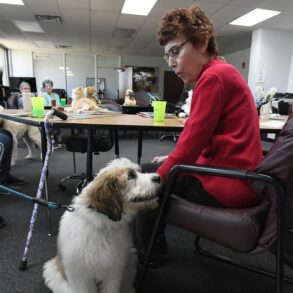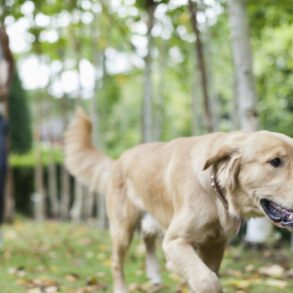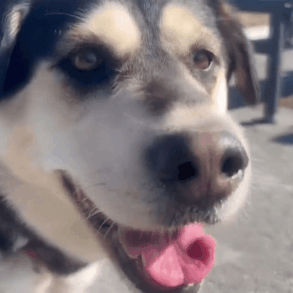At first glance, it may look like this woman is sitting on the sofa stroking her dog.
However, seconds later, the camera flips to the cockapoo, named Molly, lying on the floor—leaving viewers in hysterics as they discover what is actually on Nicola Sanderson’s lap. The text layered over the clip explains she thought she was stroking the dog, but instead it was a furry hot-water bottle.
The 40-year-old from England told Newsweek: “I realized it when she jumped up.” This can be seen in the clip, prompting Sanderson to toss the hot-water bottle onto the ground in shock and laughter.
This comical scene, shared to TikTok (@nikkisndsn), has racked up more than 4.7 million views in just three days (April 20). As of now, the video has over 927,000 likes and almost 1,000 comments.
“Not the dog getting jealous!” said one user, and another posted: “She threw it with disgust.”
“The doggy: ‘It’s my turn now,'” wrote a third commenter.

A close-up of Molly the cockapoo.
Nicola Sanderson
Research has shown that petting a dog has benefits such as reducing stress, lowering blood pressure, and boosting heart health. But there is something even more amazing about the bond between humans and their dogs: when we make eye contact or pet them, our brains literally sync up.
Researchers used brain scans to study both people and dogs while they interacted. They discovered that, when a person looks into their canine’s eyes or gently pets them, both brains display similar patterns of activity—as if they are “tuning in” to each other. This brain-to-brain connection was strongest when the person and dog were familiar with each other and grew even stronger over five days of regular contact.
The study also found that, in these interactions, humans tend to lead, and dogs follow their cues—a dynamic that mirrors how we communicate with other people.
But there was another fascinating twist. Some of the dogs in the study had a genetic mutation linked to autism-like behaviors. These canines didn’t show the same brain syncing or attention during interactions with people. However, when they were given a small amount of LSD, a psychedelic drug known for its mind-altering effects, their brain activity and social behaviors improved, reestablishing their connection with humans.
This research helps us understand how strong the human-dog bond really is—not just emotionally, but also neurologically. And it could even lead to new ways of helping people with social difficulties, like those seen in autism.
Do you have funny and adorable videos or pictures of your pet you want to share? Send them to life@newsweek.com with some details about your best friend, and they could appear in our Pet of the Week lineup.
This post was originally published on this site be sure to check out more of their content.













































